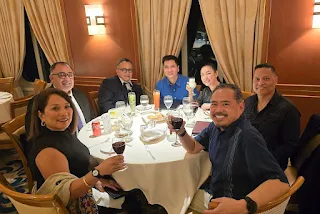When I moved to Vallejo, California in 1979, I was just a shy kid trying to fit in.
Posted on:
Coming from Chicago where my sister and I had first landed after immigrating from the Philippines, Vallejo was a different world. It was a Navy town, and most of our new classmates were kids of retired U.S. Navy men — born in the U.S., fluent only in English. By comparison, my sister and I still spoke Tagalog. We carried our culture with us — in our accents, our lunch boxes, and even in how we addressed each other. My younger sister Joy used to call me “kuya” — until I asked her to stop calling me that at school.
That’s when I first started hearing the word: FOB — “Fresh Off the Boat.” It was thrown around like an insult, often directed at Filipino immigrants who didn’t dress "right," didn’t speak "right," or who weren’t up to date on the latest American trends. It stung. Because I knew that if I wasn’t careful, that label would be slapped on me too.
What’s worse — this term didn’t come from non-Filipinos. It came from fellow Filipino-Americans. Kids who were born here. Kids whose own parents had made the same journey ours had. What they forgot — or chose to forget — is that if you call someone a FOB, you're essentially insulting your own parents, your magulang. You're mocking the people who gave everything so you could have this life.
I find the term derogatory. It reinforces a hierarchy within our own community, one that says: "I'm better than you because I’ve adapted more." It’s the same kind of thinking that divides us — by class, by language, by region. It's toxic, and it needs to stop.
I was always aware of the power of words. Back in the ’90s, a close friend corrected me when I referred to someone or something as “Oriental.” He told me that the proper term was “Asian.” I listened, I learned, and I stopped. Funny enough, that same friend still uses the word FOB to this day. Maybe it’s time we all did a little unlearning.
Let’s Reclaim Respect
If you're Filipino-American and you’ve ever used the term “FOB,” think about who you’re talking about. Think about your own family’s journey. Instead of using it to shame or separate, let’s uplift and unite. Let’s celebrate the resilience it takes to migrate across the world, learn a new language, and start from scratch. That’s not something to mock — it’s something to honor.
Let’s stop calling each other FOBs. Let’s start seeing each other as kapwa — fellow human beings, fellow Filipinos, with shared roots and dreams.
Pinoy Pride isn’t just about waving the flag. It’s about lifting each other up, no matter what boat we arrived on.
And little sister, you can start calling me "kuya" again. Salamat.
— A Filipino-American Who Remembers
“I’m Filipino / I eat adobo / I use a tabo.” -- Mikey Bustos, "FILIPINO"
📣 Got a Story or Photo to Share?
Join the Filipino-American conversation 🇵🇭🇺🇸
We're always looking for powerful stories, old photos, reflections, and events that showcase Pinoy Pride and Pinay Beauty—whether it's about migration, family, military roots, cultural traditions, or everyday Filipino strength. Even photos of what you just ordered at your favorite or new eatery.
Sharing is caring... & easy:
✉️ Email your story or photo to info87290.pinoybuilt.com@blogger.com
📱 You can write straight from your phone or computer
🤖 Use tools like ChatGPT to help draft your thoughts if needed!
💬 Please leave a Comment
We’d love to hear your thoughts, memories, or your own experiences related to this story. If you can’t share your story yet, visit us again and again — and comment! Your voice matters in keeping our history alive.
Be proud. Be bold. Be PinoyBuilt.
💬 Instagram: @PinoyBuilt
🧵 Threads: @PinoyBuilt
👍 Facebook: @PinoyBuilt
🐦 Twitter/X: @PinoyBuilt
▶️ YouTube: @Pinoy_Built












0 Comments
Hi! Thank you for dropping by. Please leave us a comment.